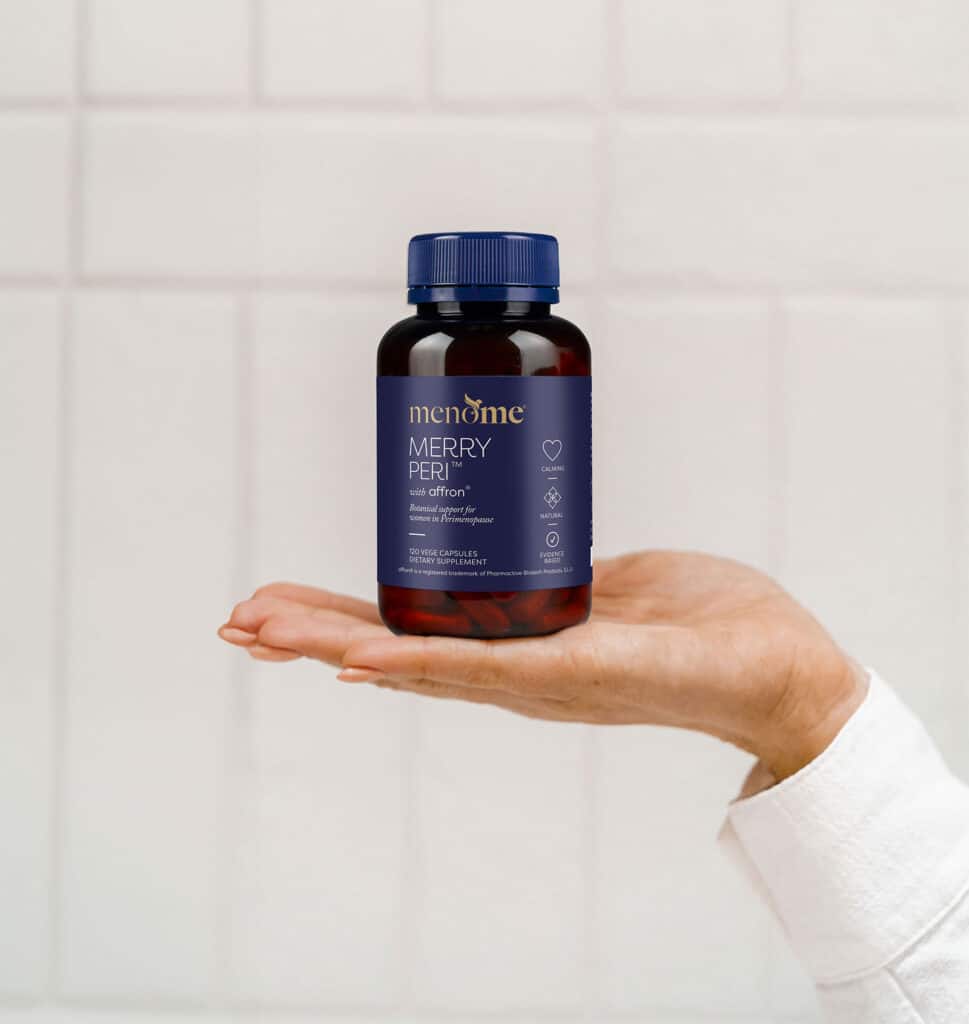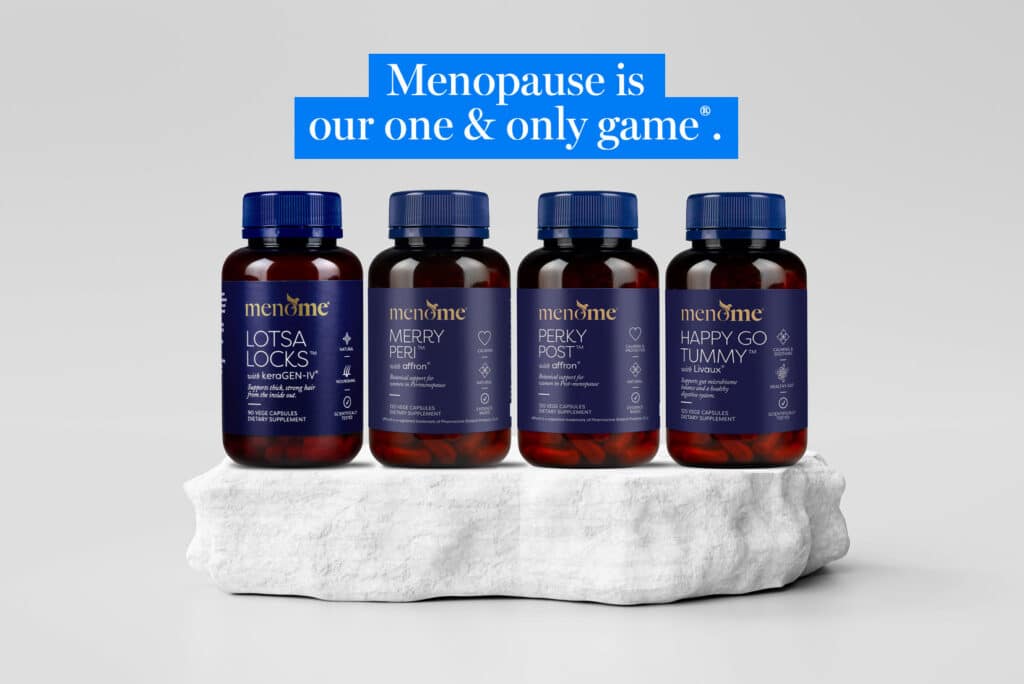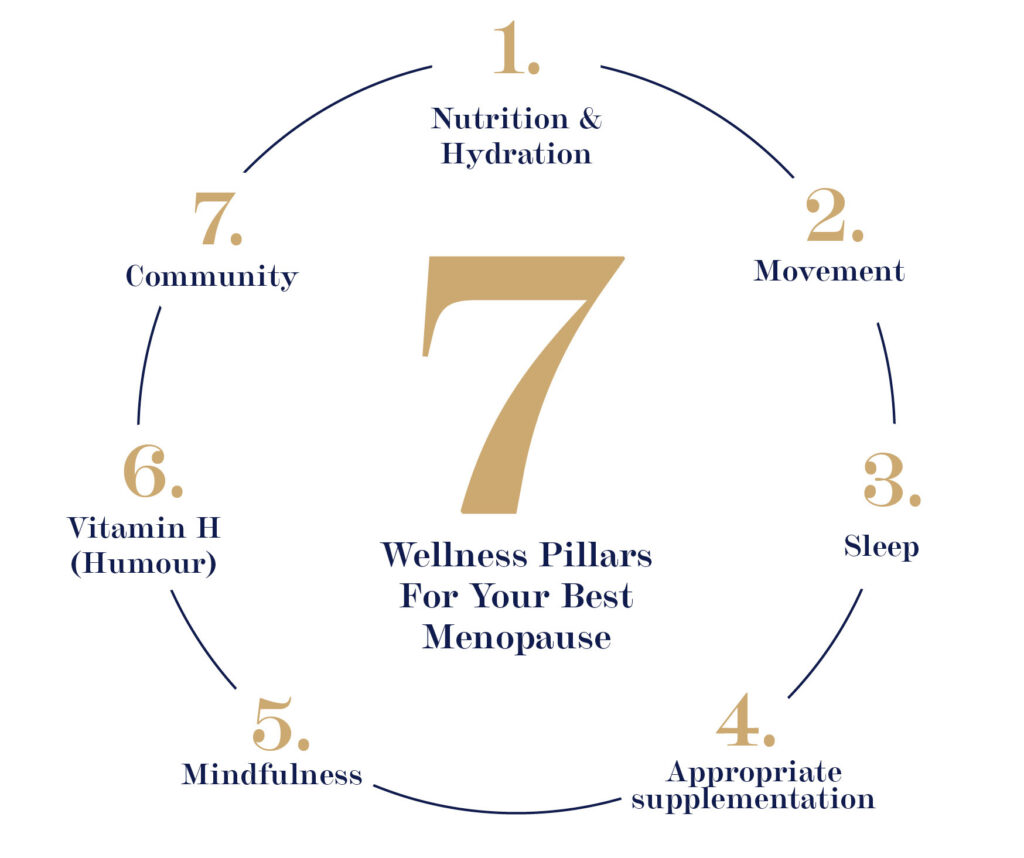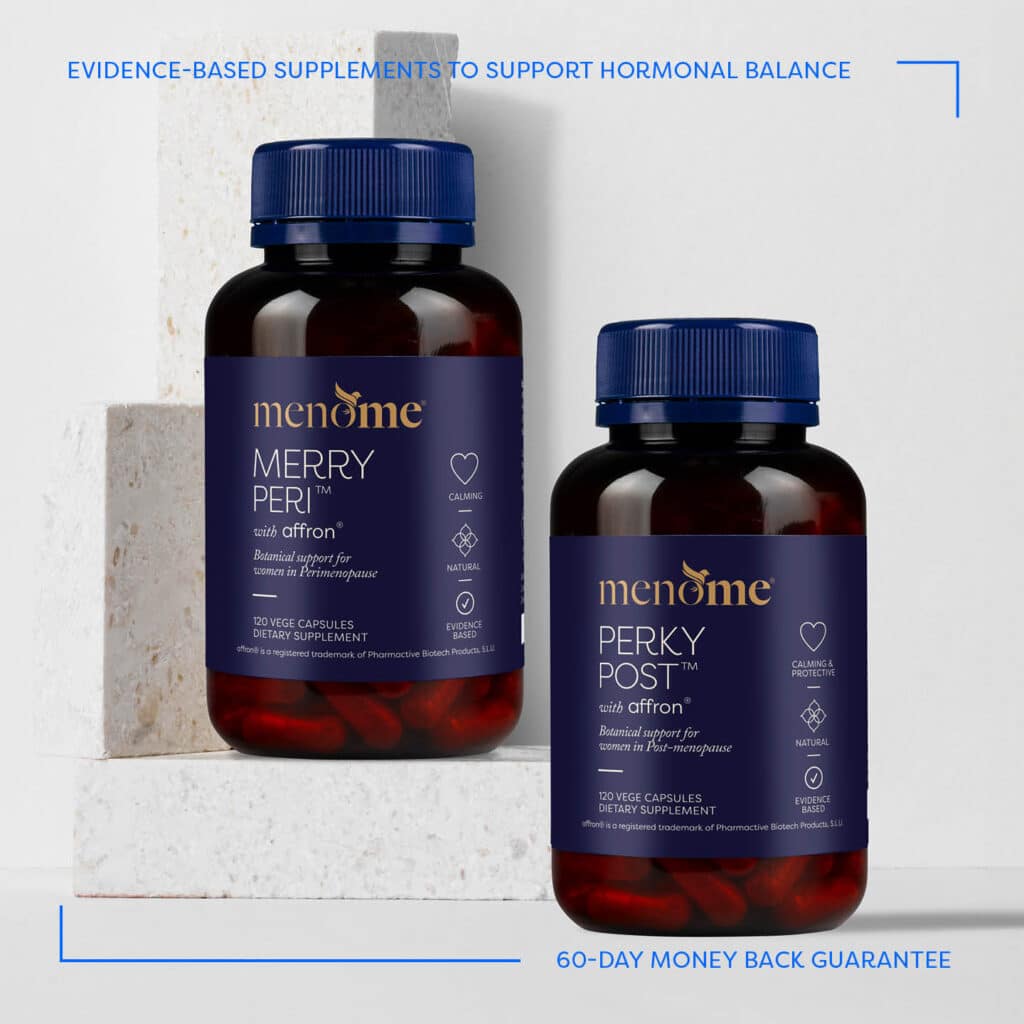
Firstly, I didn’t realise I’d been in perimenopause – the years that lead up to menopause. Although I’ve worked in the wellbeing industry as a specialist health and beauty editor for over 20 years! As such, I’m knowledgeable on the women’s health front but I still didn’t have a clue. Why? I think it’s because nobody was talking about it. Historically, it’s been one of the last taboos although the conversation is beginning to open up.
Thankfully, that’s (finally) changing.
It’s only now, in retrospect, that I can see I’ve made some very serious, life-changing decisions while going through peri. So for those of you who I support when you’re struggling, know my empathy is genuine.
You might like 4 Ways To Prepare For Perimenopause Before It Begins
Before perimenopause: rolling back the years
Let’s roll back a few years. I’m not sure how many because I don’t know when perimenopause began. I mean, what the heck was peri?!
I was in a long-term, second-time-around partnership with an intelligent, handsome and kind man. Of course, ‘perfect’ doesn’t exist but it was a wonderful relationship. We had a privileged life and he was an incredible person.
I was happier and more settled than I’d ever been. He was my rock. With respect to his privacy, let’s call him ‘lovely man’ (LM).
I also had two fantastic stepchildren. They were 9 and 12 when we first got together. However, as time went on, their puberty hormones began raging. This didn’t mix well with the perimenopausal hormonal rollercoaster that was beginning to unfold within our household. But none of us had any idea.
You might like Do Your Children Need To Know About Your Menopause?
Irrational times

Then LM heard he was going to be made redundant from his lucrative senior level position. He became dark, moody, ‘shouty’ and behaved like someone I didn’t know.
I now know redundancy can be a complicated thing, especially for a man. It thwarts their deeply ingrained provider instincts. But when I told him he was acting like a monster he shook his head and literally roared at me.
My stepson also became intolerable, mirroring his father. As a result, I found myself crying frequently and I have vivid memories of running on the treadmill at the gym with tears streaming down my face.
Feeling desperate and putting my emotional turmoil down to their behaviour, I left.
Yes, it was that serious and I was that irrational.
In hindsight, I suspect the tears, irritability and the feeling of not being able to cope were due to perimenopause.
You might like The 34 Symptoms Of Perimenopause
Leaving home
I stayed with my best friend who not long later reunited with her childhood sweetheart in the UK. While I was thrilled for her, I knew they needed the space to get to know each other again. It was a challenging time. I bounced from friend to friend, miserable and lost. Eventually, I began having trouble breathing (stress) and ended up going ‘home’. LM and I decided to look for a house for me.
It took us about a year to find my house and we spent three months renovating it together. Although doing up a house is my happy place it was also a time of mixed emotions. A combination of creativity and fun tinged with sadness.
When the renovations were completed I moved in – it was difficult for both of us as we were still best friends. Then I started an online business working 18 hour days and had no time for him. When he finished work, he lost all of his confidence.
You might like A Heartfelt Letter To My Male Partner
Ch-ch-changes
Fast forward again.
I wound up in hospital with clots in my lungs (pulmonary emboli – PE). While working on a photoshoot with Dr Libby a few weeks later she told me that lung problems can relate to grief, which was telling.
And while completing EFT (emotional freedom technique) training, one of the lectures demonstrated under a microscope how stress thickens and clots blood.
Whatever the reason, it was the beginning of two years of being admitted into hospital every three months or so. Consequently, I went on to have numerous CT scans as PE’s are linked to ovarian cancer.
During this time, my periods stopped. I put it down to everything my body had been through physically. Perimenopause didn’t enter my mind, it just wasn’t on my radar.
When I asked to be taken off the anticoagulant Warfarin and put on something else my periods returned, albeit spasmodically but I still didn’t connect the dots.
And not one of my doctors broached the subject either.
Then LM asked me to sell the house.
Challenges
That was difficult. Especially in light of my inability to handle life’s stressors due to – what I now know – must have been perimenopause. Rapid weight loss meant I was a size 10, but I looked terrible. I also developed chronic pain everywhere, not only in my joints but also my fascia and muscles. It would move around and became so bad at times I couldn’t walk or even handle the weight of the bedclothes. Cleaning and packing to move was way beyond my capabilities.
Once again, I now know that diminished estrogen (or specifically estradiol) can lead to pain and inflammation. In fact, studies have linked perimenopause with chronic pain.
When my home sold I brought a rental in a smaller town and went to Europe. My BFF had moved to London and my Irish family live in Northern Ireland.
You might like The Ins & Outs Of Midlife Joint Pain
Meeting MenoMe®
Three months later, I returned to New Zealand and met biochemist Peter Lehrke while judging a beauty award. I wanted to change my career direction but didn’t have a clear vision. Still a digital publisher, I’d decided to train as an integrative health coach to help other 40+ women so my goal of helping and educating women hadn’t changed. It’s my life’s work.
And in my business I continued to cover my specialist subjects of health and beauty with some fashion and style thrown in. But I wanted to delve deeper. Peter told me about MenoMe®, which was founded by Peter, Leigh Kite and Deanne Werder-McCrea to help women transition through menopause and support them in post-menopause. (Peter has since exited the business.)
After talking to Leigh (now our managing director) a penny dropped. She told me she’d felt like she was going mad.
And I remembered texting LM at one point saying, ‘‘I think I’m going mad’’.
Alas, too late I discovered it wasn’t me, but rather my hormones!
We’re uneducated
As I’m a women’s health researcher, I looked into it more. And that’s when I discovered how poorly educated we are about menopause.
Like most of us, I had the widely held view that menopause was an ‘event’ way off in the distance. The truth is, the first – very subtle – hormonal changes begin to occur in our 30s.

In addition, I had the stereotypical ‘menopausal matron’ image in my head but nothing could be further from the truth.
Menopause isn’t an automatic passport to the frumpy category. Look at Michelle Obama, Elle McPherson, Jennifer Aniston, Kylie Minogue, Sarah Jessica Parker, Sandra Bullock and Nicole Kidman. Not to mention our own Rebecca Gibney.
These are women in their menopausal years who are vibrant, sexy and beautiful.
That’s when I understood the urgent need to get some education out there to rid us of the ‘taboo’. It’s time for change.
(I originally wrote this story in 2018 and it’s only now that the conversation is opening up.)
You might like The History and Stigma Of Menopause
Signs of perimenopause
The experience also led me to realise why I was having so much trouble with my bladder and urinary tract infections. This can be one of the uncomfortable side effects of perimenopause.
Another piece of the puzzle that fell into place was the heat waves, anxiety, itchy skin and dizzy spells I’d been experiencing.
Again, they were all symptoms of perimenopause.
The anxiety was paralysing. It was a big part of my job to front up to glamorous events regularly but I’d find myself hiding outside in the car. I couldn’t go in.
In fact, I hated leaving the house at all. I’d spend days indoors without venturing outside. (Another common sign.)
During my European travels, I’d chatted with a couple of girlfriends about menopause. They’d told me stories of bleeding in floods with no warning. One had been on the Tube in white jeans (and luckily an overcoat). Another had experienced this on a long-haul flight.
Some of you have since told me you called an ambulance when it happened to you.
Taking Merry Peri®

All in all, of the 34 most common signs I think I’ve experienced most of them. And the powers-that-be thought they’re throw in a few others for good measure!
Thank goodness for MenoMe® I say.
Once I started taking Merry Peri® many of them faded out with the added bonus of giving me strong nails. I put that down to a happy side effect – as it turns out, plenty of you have experienced this too.
When I started taking Merry Peri® I began to feel more even-tempered and in control of my life after just a few days*.
I was still having hot flushes, but I knew what they were now.
In the end, it took quite a few months for those to disappear even with taking Merry Peri®. In some cases, like mine, they can be tenacious but I stuck with it.
Sometimes, even now, I’ll still have a wave although they’re nothing like what they used to be. We call those ‘fluctuations’ and we recommend you keep on with your Merry Peri® or Perky Post® and ride them through as they should settle down again.
*Results vary according to the individual. We find it takes an average of six weeks and up to 12 for optimum benefits.
Why self care is important
By the way, I pretty much know I’ll have a hot flush if I have coffee, wine or if I get too stressed.
If it’s humanly possible we need to mitigate stress as much as we can. Something I hope I’ve demonstrated with this story.
As I specialise in working with women in peri- and post-menopause now I’m also almost evangelical about self care for stress management. Because, if a menopausal woman’s cortisol (the stress hormone) gets too high, it will worsen symptoms and encourage weight gain.
Cortisol is a great hormone, it gets us going in the morning but we want it to lower as the day goes on.
Let’s help each other
For me, this story is raw and uncomfortable. It would seem I’ve made some rather momentous decisions while under the influence of raging, changing hormones.
And who knew? It’s why I beat the drum – along with Leigh and Dee – of ‘knowledge is power’ every day.

But there have also been some amazing outcomes and happy endings.
These days:
- I’ve pivoted in my career and I’m now an accredited wellness and menopause coach for 40+ women. As such I’m impassioned to help others with their weight management and midlife hormone challenges.
- The in-depth science of women’s hormones through a functional medicine lens is something I continue to study further.
- The modalities I’m aligned with are known as ‘Lifestyle Medicine’. This is a rapidly growing area of care throughout Australia and New Zealand amongst academics, medical professionals and wellness practitioners. It takes into account every area of a person’s life – emotional, physical and spiritual.
- It’s wonderful that at MenoMe® we help women like you navigate this – sometimes testing – life stage.
- I’m still close to my stepdaughter and I’m very proud of her. She is smart, grounded, beautiful, in a stable relationship and doing well in her career. I’ve explained the story to her, therefore she’s very perimenopause aware for someone in her 20s!
Was it life or perimenopause that created these changes?
I’m not 100% sure. But I do know that a lot of what I experienced can be linked to changing hormones and exacerbated by stress.
And I can tell you is that some women sail through perimenopause, but for others it’s an apocalypse. In fact, there’s a book called ‘Menopocalypse: How I Learned To Thrive During Menopause and How You Can Too’ by Amanda Thebe.
I know we’re not alone in our experience because I speak to you all daily. And that’s why MenoMe® is here. To help.
Merry Peri® changed my life and I love that it’s all-natural, vegetarian and gluten-free.
I try and follow a dairy-free, gluten-free, vegetarian diet much of the time. This is because it’s hormone-friendly and anti-inflammatory.

This way of eating is also very good for weight management. And it can also be helpful because as we move into our 40s and 50s, our thyroid, digestion and insulin activity changes.
So for some of us – though certainly not all – foods containing dairy, gluten and/or meat can become problematic.
Unless you’re under the guidance of a specialist wellness professional it’s best to stick to the Mediterranean Diet. Science has shown over and over again its benefits and it incorporates all food groups.
Oh, and by the way. I’ve now moved to Perky Post® because it has extra support for mental clarity, libido, energy and bone health.
And I’ve also started taking the award-winning LotsaLocks® for hair density. As a former beauty editor who has tried thousands of products I have to tell you this one is incredible. It does what it promises. 😊
The 7 Wellness Pillars
I’ve had to take everything into account to get my mojo back. Some of it has underpinned our 7 Wellness Pillars For Your Best Menopause:
- Nutrition & hydration
- Movement
- Sleep
- Appropriate supplementation
- Mindfulness
- Vitamin H (humour)
- Community

These are the tools we’ve learned, and science backs, that can help you navigate your way to your best peri and post-menopause.
A sense of community is important too which is why we have our private Facebook group, the 40+ Ageless Goddesses Club. Click here to join.
The menopause transition requires a multi-pronged approach, which I feel is the gateway to successfully transitioning us into a joyful post-menopause.
WE NEED YOU:
Thank you for reading my story.
If it resonated with you, or if you’ve had a different experience you’re willing to share we’d love to hear it.
We’re putting a library of real stories together so we can learn from each other.
If you are up for telling your story, email me here. Or we have a form here that you can fill out and then I’ll be in touch to interview you.
If that’s out of your comfort zone (I hear you – it wasn’t easy sharing this and it’s taken five years to publish it!), feel free to forward this to anyone you think it might help. You can read Leigh and Dee’s stories below.
And a word of advice? Don’t make life-changing decisions during the meno years. 😊
Main photo by Alexandr Podvalny from Pexels










